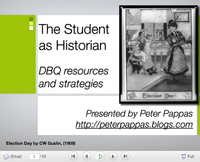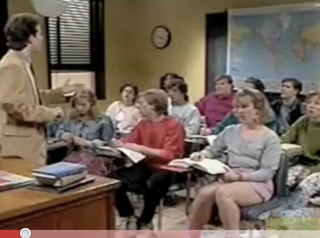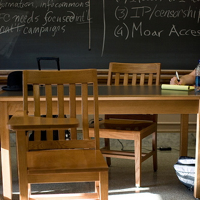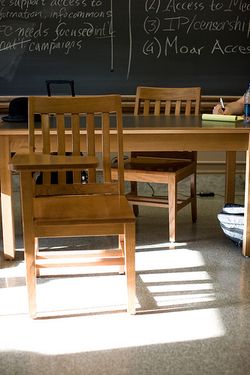The NY Times recently showcased the proposed revamping of the AP program and testing – “Rethinking Advanced Placement” (1/7/11)
“A preview of the changes shows that the board will slash the amount of material students need to know for the tests … The goal is to clear students’ minds to focus on bigger concepts and stimulate more analytic thinking. … Trevor Packer, the College Board’s vice president for Advanced Placement, notes that the changes mark a new direction for the board, which has focused on the tests more than the courses. …’We really believe that the New A.P. needs to be anchored in a curriculum that focuses on what students need to be able to do with their knowledge,’ Mr. Packer says.”
In recent years, many high schools have stopped offering AP courses, and a growing number of universities have raised AP score requirements or no longer award credit for the test. Memorization might have been a valued skill when AP testing began in 1956, but today many AP courses have become little more than relentless test prep.
As the College Board phases in the new courses and tests over the next few years, more teachers will feel free to restructure courses to support greater depth and student-centered inquiry. I urge teachers to forge ahead courageously. My experience teaching AP in “seminar approach” back in the 1990’s convinced me that advanced placement can be much more engaging than memorizing loads of information for an exam.
I was fortunate to have been mentored in that format by senior members of my high school social studies department – a hat tip to Brian Bell, Jim Wittig and Pete Crooker who pioneered the seminar approach used in our AP social studies classes. BTW – Our students scored very well on the AP exams.
Class size typically ran between 24 – 36 students. All students in the class would meet one day per week in a large group session. This might be used for unit testing, or to introduce or conclude a seminar with a lecture or full group discussion. The large group was also was divided into 4 seminar groups of 6-9 students. They would meet with me one day per week. Thus each student met one day per week in seminar and another day in large group. During the remainder of their week they worked independently or with their seminar group in preparation for the upcoming assignment. Today, we would call that “flipping the classroom.”
Of course, there were many weeks that were modified because of vacations and other interuptions – but you get the idea. Our high school was on traditional 8 period schedule. These AP classes were taught in a double period configuration of about 95 minutes for either the seminar classes or large group sessions.
My first experience was teaching one semester of AP US History while one of my colleagues was on leave. I focused on essential questions that fostered greater depth and relevance. Thus the typical question – “Should the Constitution be ratified?” became “How powerful should the national government be?” Anyone following the reauthorization of NCLB or the proposed health care legislation knows the enduring relevance of that question. For more on that approach, see my post “Essential Questions in American History: The Great Debates.”
After my semester of APUSH, I settled into my primary AP assignment – one semester classes in AP American Government / Politics and AP Comparative Government. There I used the seminar approach to give students guided experience in research, critical thinking, collaboration and presentation.
Visualize the typical American government lesson. Teacher standing up front asking students to follow along as they go over the diagram of “how a bill becomes a law.” Contrast that with an outline of one of my AP US Gov seminars on the same topic.
Congress and the Lobbyists
This extended seminar will investigate the relationships between Congress and the lobbyists. You will develop an investigative report which will ultimately answer the question “Does Congress represent the needs of its public constituency (the electorate) or its financial constituency (its contributors)? Weekly seminar abstracts will be used to prepare Tabloid TV-style PowerPoint report in support of your investigation. To see the full seminar assignment click here.
Students were assigned a member of Congress who sat on one of the major committees. Their task over the next few weeks included researching and developing the following:
- Demographic / political profile of their legislator’s elective constituency.
- Profile of their financial contributors.
- Committee jurisdiction and major lobbyists.
- Voting record on legislation of interest to their elective constituency and financial contributors.
- Their answer to the seminar question with supportive reasoning.
- Presentation and reflection
The latest word from the College Board says that they plan to delay their implementation of the new AP US History until 2012-13 See: “New Advanced Placement Biology Is Ready to Roll Out, but U.S. History Isn’t”
I hope that won’t delay teachers from realizing that they can get students prepared for the AP exams without resorting to a force-fed test prep model of instruction.

My SlideShare of DBQ resources / strategies for students historians
“Think” image credit flickr/Stig Nygaard
Like this:
Like Loading...
 I'm pleased to be invited as a guest blogger to the Instructional Technology Strategies Conference (ITSC) Feb 20-22 in Portland, Oregon. More I'll be there, but you better hurry up and register. Registration closes on Wed 2/16!
I'm pleased to be invited as a guest blogger to the Instructional Technology Strategies Conference (ITSC) Feb 20-22 in Portland, Oregon. More I'll be there, but you better hurry up and register. Registration closes on Wed 2/16!





